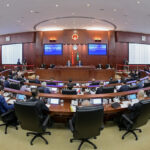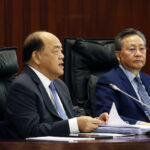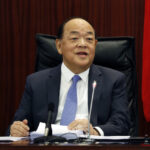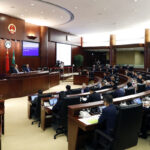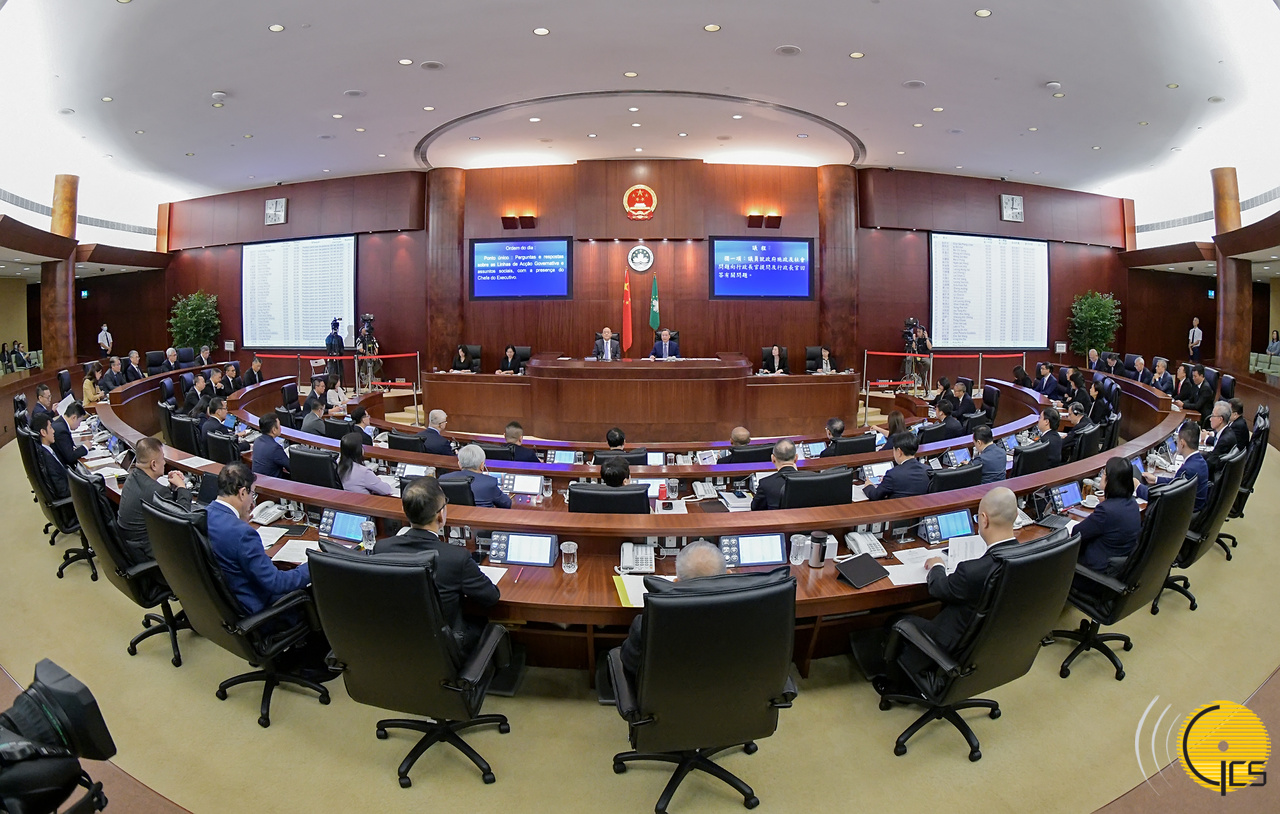 The Chief Executive, Mr Ho Iat Seng, attends a plenary session of the Legislative Assembly to answer Legislative Assembly members' questions on Government policy and social issues.
The Chief Executive, Mr Ho Iat Seng, attends a plenary session of the Legislative Assembly to answer Legislative Assembly members' questions on Government policy and social issues.
The Chief Executive, Mr Ho Iat Seng, said under the “1+4” development strategy, the Government played merely a supporting role while the market should take the lead to ensure the development needs of the market would be met, and the goal of economic diversification would be achieved.
On Friday (11 August), Mr Ho attended a plenary session of the Legislative Assembly, where he took questions from members of the Legislative Assembly regarding Government policy and social issues.
The Government was now undergoing a public consultation regarding its proposal for the “Development Plan for Appropriate Economic Diversification of the Macao Special Administrative Region (2024-2028)”. The Government has previously held 13 sessions to hear opinions from professionals and experts, and has drawn up the consultation document based on the opinions collected.
The“1+4”appropriate diversification development strategy aims to enrich Macao’s function as “One Centre” for integrated tourism and leisure, while facilitating the development of four nascent industries, namely: the “Big Health” industry; modern financial services; high and new technology; and convention and exhibition, sports, and the commercial and trade industries.
The Chief Executive said upon completion of the public consultation on the Development Plan for Appropriate Economic Diversification, the Government would review all opinions collected and consolidate them into Macao’s Five-Year Development Plan. Meanwhile the “1+4” economic diversification strategy should go hand-in-hand with the development of the Guangdong-Macao Intensive Cooperation Zone in Hengqin, stressed Mr Ho.
Macao and Hengqin had sufficient industrial land to support the development of industries, said the Chief Executive. A 200,000 square-metre piece of land in the Cooperation Zone had been reserved as a Macao industrial area. A 40,000-square-metre area to serve Macao for industrial transformation purposes would be initiated first, said Mr Ho.
The Government was actively promoting appropriate economic diversification. developing the four major industries, promoting industrial transformation and upgrading, and promoting high and new tech industries. The existing industrial premises in Macao had sufficient space for those businesses and there was no need to open new places. Macao had a number of industrial zones, including Concordia Industrial Park; Pac On; Ka Ho; and Zhuhai-Macao Cross-Border Industrial Zone. A number of pharmaceutical factories had settled in Concordia Industrial Park, noted Mr Ho.
Mr Ho additionally said the Financial System Act of Macao, recently passed by the Legislative Assembly, had included much content related to the field of modern financial services, including digital currency and cryptocurrency. He said the Government was keeping an open mind on those two products, but stressed that they could only be introduced provided that sound conditions were met to ensure that Macao’s economy – which was small in scale – was not affected.
At Friday’s session there was also discussion regarding Macao’s role in serving China and Portuguese-speaking countries. Mr Ho said the 6th Ministerial Conference of theForum for Economic and Trade Co-operation between China and Portuguese-speaking Countries (Macao) would take place in Macao in 2024.
The Government would assist with the new tasks of the Ministerial Conference, and support its work of furthering the role of Macao in serving as a bridging role between China and Portuguese-speaking countries. Mr Ho noted that Portugal had been his first overseas visit after the COVID-19 pandemic. The April visit had been aimed at strengthening Macao’s role as a platform between China and Portuguese-speaking countries. The Portuguese side had also affirmed and strongly supported Macao’s work in that regard.
The two decades since the establishment of the Forum Macao mechanism had seen a large volume of bilateral trade, and exchanges being facilitated. Trade volume had increased year by year, and the fields of such trade had been continuously expanded, said Mr Ho.
In response to questions regarding visitor arrivals, the Chief Executive said that Hong Kong, Macao and Taiwan were the three outbound destinations most commonly visited by mainland China travellers in the first half of this year, accounting for 79 percent of the total volume. Of that 79 percent, Macao accounted for nearly 50 percent of the visits, thanks to Macao’s tourism promotion efforts over the past three years, stated Mr Ho.
It was mandatory in terms of the development of the Macao tourism industry, that the sector should attract a greater number of overseas visitors, said Mr Ho. However, due to the unstable global economy and the incomplete recovery of the air travel market, it would be difficult for Macao to expand its international-tourist sources. Macao had many five-star hotels, which had advantages in terms of facilities and services. Various departments were making continuous efforts to promote Macao to visitors.
In addition, the Government has currently been studying the idea of increasing the proportion of three-star hotels in the market, in order to be able to welcome more tour groups. Meanwhile, the Government had plans to issue additional taxi licences, as well as to strive to formulate a "Civil Aviation Law" in a timely manner, with a view to attracting more airlines to set up civil aviation operations in Macao. This would help open more international routes to Macao, in a bid to enhance the city’s attractiveness to tourists, and the city’s competitiveness.
Regarding the promotion of the "tourism +" strategy, the Chief Executive said that the Government was focusing on the development of the “big health” industry with research and development relating to the manufacturing of traditional Chinese medicine as an entry point.
The Islands District Medical Complex would be opened this year in phases. The facility was base in Macao, facing the Guangdong-Hong Kong-Macao Greater Bay Area and other places, enriching the city’s offering under the “medical + tourism” strategy.
As of July 31, the Government had received a total of 118 applications for the registration of proprietary Chinese medicines, of which 20 Chinese patent medicines had been registered, and some of them had been registered in Portuguese-speaking countries in Africa. Chinese patent medicines could now be exported to the relevant areas, which was of great significance to Macao in playing its role as commercial and trade cooperationservice platform between China and Portuguese-speaking countries.
In addition, a total of 36 new medications had been approved for marketing in Macao, 14 of them being first-of-their-kind drugs. It was believed that hospitals in Macao – making use of advanced equipment, outstanding medical teams, and good-quality medications – would strengthen the effect of the "medical + tourism" development strategy.
As for measures to help small and medium-sized enterprises (SMEs), the Chief Executive said that the Government’s support for business focused mainly on policy support and assistance with publicity, in order to increase the popularity to consumers of such entities. One of the efforts was to promote approximately 200 restaurants in Macao, so tourists had a better understanding of Macao's rich and diverse food culture. This would attract more tourists to come to Macao for "food tourism".
In addition, channels of the public broadcaster TDM would be launched in the Greater Bay Area, to provide wider coverage of its programming. The Government would use that as an opportunity to support local SMEs, and to strengthen their public profile. The Chief Executive called on SMEs to change and innovate in their ways of thinking, and create distinctive image elements for their respective brands, in order to appeal to customers.
Mr Ho said details of pre-sale arrangements regarding the Macao New Neighbourhood project in Hengqin were likely to be announced in September. Currently, screening of investment projects was under way, and the primary school buildings in the area had also been completed. A number of supporting facilities within the Macao New Neighbourhood project was advancing in a timely manner. Standards within the facilities were consistent with those in facilities in Macao, including provision of television signals, the Internet, and property-management arrangements.
During Friday’s question-and-answer session, the Chief Executive took questions raised by 31 members of the Legislative Assembly. Other topics discussed included consumer prices; employment; education, talent development policy; preparations for the National Games; development of the cultural and tourism industry; population policy; protection of consumer rights; the Wealth Partaking Scheme; caring for the elderly and for the disadvantaged; public administration reform; e-government; transportation, and environmental protection.


